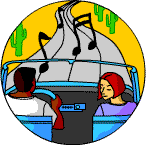European Union - Crazy or Not?
Created | Updated Apr 2, 2012

The European Union (EU) has an entirely unjustified reputation for creating odd rules and prohibitions. We all remember the fuss about 'straight bananas', when it was claimed that the EU insisted all bananas should be straight, and that curved, yellow fruit could not be sold under the name 'bananas'. This sounded ridiculous, and in fact was. The European Union never passed any such law or prohibition.
One recent rule, though it sounds crazy, turns out to have a good reason behind it. We're talking here about the ban on loose food and drink in cars. No longer will we be able to munch on crisps1 as we drive.
Momentum
The reason for this is momentum. Momentum is a property that moving bodies have - it confers an ability to do damage when the moving mass strikes into a stationary body. Physicists have always used the simple approximation that momentum is the product of mass and velocity. Sir Isaac Newton himself insisted that this was true.
Recent experiments, however, have shown that physicists have been seriously underestimating the magnitude of momentum. A more accurate value for momentum is given by the following formula:
Momentum = (Mass × Velocity)φ
In this, the Greek letter φ (phi) represents the so-called 'Golden Ratio', an irrational number with an approximate value of 1.618.
So what does this mean, then? Well, for small values of speed (or velocity) the value of momentum is much the same as the traditional method of calculating it. But for higher speeds, such as for example, the 70 mph (approximately 112km/h) of British motorways, loose items in your car will have much more momentum than was previously thought. The upshot is that in a crash, loose items will bounce around the cabin of the car doing untold damage.
It is estimated that for a crash involving a car travelling at the aforementioned 70mph, a loose crisp packet will have the same momentum, and hence will do the same damage, as a charging bull elephant. Loose peanuts will have the destructive power of the bullet from a Colt 45, while even the humble Malteser, famed for its lightness, will develop the ability to shatter windscreens in a chocolatey explosion.
Making it Safe
Any food that is not strapped down will exhibit this destructive capacity - hence the EU insistence that seat belts should be provided, not just for human passengers, but also for their food items. While the straight banana was a malicious rumour invented by those British grumblers who feel that nothing good ever came from Europe, the 'banana belt' is a genuine EU requirement.
Europe's law givers have given member countries a full 12 months to become compliant with the new law, so seat belts for bananas and other food items will become compulsory on 1 April, 2013.
